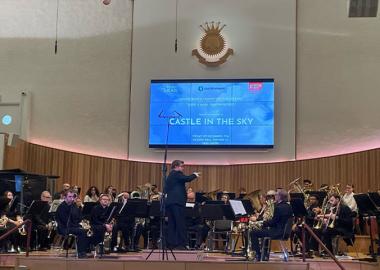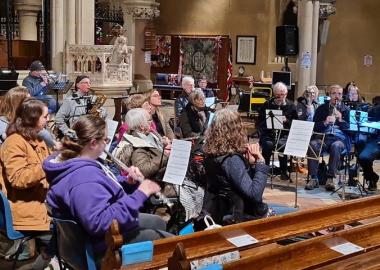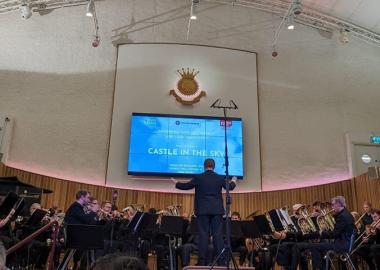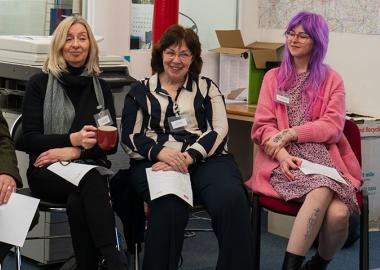Nathan James Dearden shares the inspiration behind Three Postcards, composed as part his 2018/19 Adopt a Composer collaboration with Swansea Philharmonic Choir.
When writing for voice or grouped voices, I have always considered the text’s relationship to musical form and structure, which often guides harmonic decisions and the pacing of the music, but have never had the opportunity to work as closely to the source of the text – the poet. This is a key aspect of the music making process that I feel can be overlooked; amazing when you consider how significant, if not the most significant, the element of the text can be for vocal music.
As part of the workshops with the Swansea Philharmonic Choir and conductor Jon Rogers, we have created three responses in the form of 'postcards' to the city of Swansea, marking the 50th anniversary of Swansea being given city status and the choir’s 60th anniversary. Two of the responses have already received a preview performance during the process, and all three will be premiered as a set in December.
The idea of home has been one that regularly plays on my mind throughout this process, particularly being back on home turf and working with a choir whose location is so important to their identity.
The first of the three postcards developed through an email conversation (set up by a member of the choir) with local Swansea poet, Rebecca Lowe, whose recent work has married the rich output of Welsh poet and writer Dylan Thomas, with the modern landscape of the city. Living with Becky’s work for a few months in late 2018, I immediately took to a particular stanza in her LovelyUgly, a direct response to Thomas: “Home… To the boot blackened brushed up Sunday best Baptist / Leaning slack backed on ancient pews With limbs like a lobster / Bent into double-jointed Mumblings of worship / ‘Guide me o thou Great Jehovah Pilgrim through this…’”

Nathan James Dearden and Rebecca Lowe
The idea of home has been one that regularly plays on my mind throughout this process, particularly being back on home turf and working with a choir whose location is so important to their identity – much like any musical community, professional or non-professional. A home may not merely be the four walls that surround you, but the people within it, the memories you share and the community that surrounds it. This first choral response, Home…, is shaped by the good and the bad. Home can be the shelter from the outside. Home for some can be a place of worship or a safe place you hold close. Home is fluid and can be moved.
Through this excerpt of LovelyUgly, we created a work that draws an intimate idea of home – a sacred home.
A home may not merely be the four walls that surround you, but the people within it, the memories you share and the community that surrounds it.
The hymn Calon Lân has become synonymous with the Welsh people, and since the burst in popularity during the 1904-5 Welsh Revival, has weaved its way into the very fabric of Welsh identity on the international platform. Calon Lân was published in a collection called Caniadau Gwyrosydd, but it is not known where it was actually written. It has been suggested that Daniel James – of Llangyfelach Road, Treboeth, Swansea – wrote the words on the back of a cigarette packet in Blaengarw. However, the tune and its words have been a cornerstone of Swansea’s rich musical history. Its sentiments echo the Christian principle that a pure heart is finer than any material wealth.
The hymn Calon Lân has become synonymous with the Welsh people, and since the burst in popularity during the 1904-5 Welsh Revival, has weaved its way into the very fabric of Welsh identity on the international platform.
The second postcard, O’r galon, is a collaboration with writer Catrin Alun (a member of the Swansea Philharmonic Choir) to these principals of Calon Lân. From the passion within song. To the waves of the bay. These words have been incorporated into the second response, in turn creating a sort of hymn to Swansea. This response was previewed at the choir’s summer concert in June.
The third response we are currently working on in preparation for our premiere in December simply had to use the words of one of Swansea’s (if not Wales's) finest exports – Dylan Thomas. I'm sure I'm not the only one who has always said that setting Thomas’ words to music is borderline ‘sacrilegious’, as his poetry is so rich, intensely wordy, and frankly, musical to begin with. However, as a set of responses to Swansea’s equally rich history, it would seem silly not to include a direct response to Dylan Thomas’ vast output, especially since so much is about Swansea itself.

For our third postcard, we are working on a response based on a Dylan Thomas' BBC broadcast, Return Journey. It wasn’t until February 1947 that Thomas felt ready to write about the Swansea Blitz. In his broadcast, the narrator travels through Swansea seeking his younger self, and in so doing, attempts to recover a Swansea lost to the Blitz. It was recorded for the BBC Home Service in April 1947 and broadcast a month later.
I'm sure I'm not the only one who has always said that setting Thomas’ words to music is borderline ‘sacrilegious’, as his poetry is so rich, intensely wordy, and frankly, musical to begin with.
Dylan Thomas undertook meticulous research to ensure he had correctly named all the shops and buildings that had been lost, as this extract from the broadcast shows: “I went out of the hotel into the snow and walked down the high street, past the flat white wastes where all the shops had been. Eddershaw Furnishers, Curry’s Bicycles, Donegal Clothing Company, Doctor Scholl’s, Burton Tailors, W.H.Smith, Boots…- all the shops bombed and vanished. Past the hole in space where Hodges & Clothiers had been, down Castle Street, past the remembered, invisible shops”.
Here’s to the final stages of our collaboration!
Follow on social media:
Nathan James Dearden - Facebook / Twitter / SoundCloud
Swansea Philharmonic Choir - Facebook / Twitter / Instagram
The Adopt a Composer project matches vocal and instrumental leisure-time music groups with some of the UK’s most promising composers to collaborate on creating a new piece of music. The project leads to a premiere performance and broadcast on BBC Radio 3. If you’re a music group or composer and you’d like to take part, find out more.










